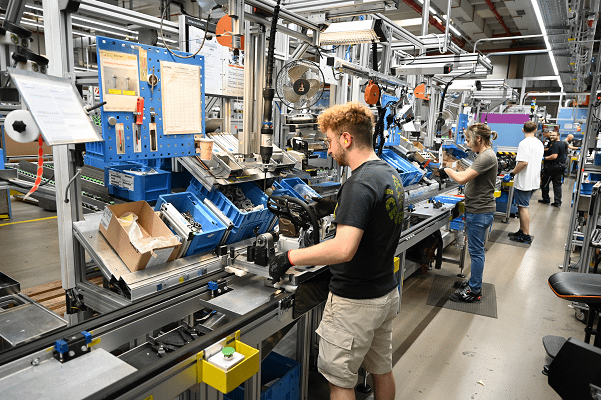Britain has an opportunity to expand green manufacturing, secure its supply chains, and develop cheaper safer energy sources if it learns from other countries’ responses to the US’ Inflation Reduction Act (IRA), a think-tank says today.
The Social Market Foundation – a cross-party think-tank – has said that fears that the IRA hurts British firms by locking them out of the American market are overblown. Instead, the SMF argues that the IRA should inspire the UK government to support its own businesses and put the country’s transition to net zero on a secure path.
Exactly a year ago, the US Inflation Reduction Act was passed, providing $391bn (roughly £310bn) of subsidies over 10 years to firms that contribute to decarbonisation. That prompted fears from other countries that their businesses would be sucked into the now more lucrative American market.
Yet far from being squeezed out, the SMF says that British businesses now face a global market opportunity of £1 trillion by 2030, with the potential to support 500,000 jobs.
A new paper from the SMF examines how the likes of Canada, Australia, New Zealand, Japan, South Korea, and the EU responded to the IRA – and summarises the key lessons for the UK.
The briefing comes at a time when British politicians’ commitment to net zero appears to be wavering, particularly in the wake of the Uxbridge by-election. Yet the examples of Canada, the United States, France and Japan highlight the potential for public investment to benefit the economy by encouraging private firms to invest their own money. Some countries have seen or project private sector investments worth four to eight times the up-front public expenditure, providing high quality jobs and increasing exports.
This won’t come cheap, however. To match the level of investment peer countries are making, the SMF said that UK would have to set aside £54 bn over 10 years – at the minimum – in addition to what has already been committed by the Government (See notes). Britain’s current debate on environmental regulations increases risk for businesses and decreases their likelihood to locate here.
Regulations should also be part of the solution. To attract investments, foreign countries are using regulations which reassure businesses and increase certainty. These include setting legally binding benchmarks for production of renewable technology, and establishing a “one stop shop” to quickly respond to and approve projects related to net zero industries.
The SMF also called for the government to prioritise a trade deal with EU to encourage the flow of renewable technologies and critical materials with the continent. It argues that the EU’s Green Deal Industrial Plan has created a potential market for British firms.
Gideon Salutin, SMF Researcher and author of the report, said, “Instead of backtracking on net zero commitments, our politicians need to look at the returns on public investment which American, European, and Japanese economies are projecting, and give British businesses the reassurance and funding they need to invest in our economy.”
“A year on, we know that British policymakers’ worst fears about the Inflation Reduction Act have not materialised. Instead of continuing to treat it like a threat, they should recognise it as an opportunity for UK manufacturers – if the right actions are in place.”
“There are plenty of useful lessons from around the world for us to learn – on the level of public funding to dedicate, on streamlining regulations, and choosing the best trade partners. This is not a race, but the foundation for long-term relationships”


Leave a Comment